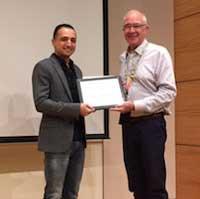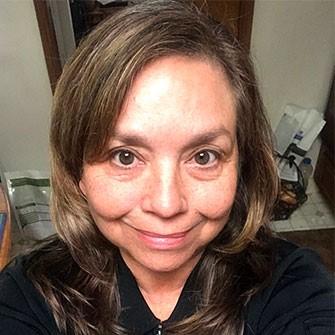The Andy I. Choi Mentoring Program of the UCSF-GIVI Center for AIDS Research announced the recipients of the 2015 Early-Career Research Excellence Awards. The awards were given at the annual Mentoring Program Research Symposium on April 17, 2015.
Image

Awardee Mohamed Mohsen and Director Paul Volberding
Excellence in Basic Research

Awardee Mohamed Mohsen and Director Paul Volberding
Mohamed Abdel-Mohsen, PhD
Dr. Abdel-Mohsen is a postdoctoral fellow at the Blood Systems Research institute (BSRI) and an Assistant Specialist at UCSF. He studies the effects of host restriction mechanisms on the regulation and reversal of HIV latency. He began his career in Cairo, Egypt, working for several years at the WHO regional reference lab for diagnosis of poliovirus, and subsequently received extensive training for the last eight years at UCSF. In addition to four first-authored publications from his PhD thesis work, he has authored another 13 in the last three years with several UCSF collaborators.
Image

Associate Director Steven Deeks, Awardee Hiroyu Hitano, and Director Paul Volberding
Excellence in Clinical Research

Associate Director Steven Deeks, Awardee Hiroyu Hitano, and Director Paul Volberding
Hiroyu Hatano, MD
Dr. Hatano studies HIV persistence and eradication strategies in long-term ART-treated individuals, as well as in “elite” controllers. She serves as clinical lead of the immediate ART treatment program called RAPID (Rapid ART Program Initiative for new Diagnoses) at Ward 86 and designs interventional studies aimed at cure and at delineating predictors of viral recrudescence with analytic treatment interruption.
Image

Excellence in Behavioral Science

Sheri Lippman, PhD
Dr. Lippman is an Assistant Professor in the Division of Prevention Sciences. Her research aims to elucidate how social and structural contexts shape health behaviors and vulnerability to STI/HIV and to develop approaches for modifying the community social environment to reduce new HIV infections. Her work includes a focus on advancing theory and measurement of community level factors (e.g. gender norms, stigma, community cohesion) to better understand social mechanisms of effect and evaluate how they lead to changes in biological outcomes.
